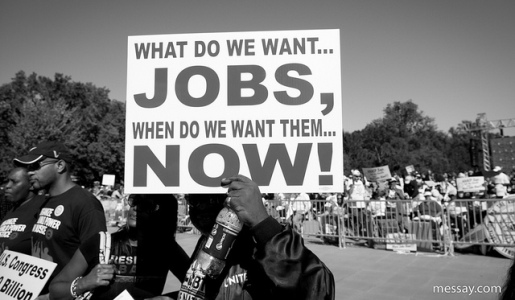
Many in the labor movement say the big election losses suffered by workers in November 2010 should have surprised no one. They say the first indicator of the November defeat was the January Supreme Court decision that threw out almost all existing curbs on corporate election spending.
“The Supreme Court installed the Republican House just as it installed George Bush 10 years ago,” said a top aide to a national union leader.
Others in the labor movement note that an official unemployment rate just below 10 percent, when added to the unlimited tide of corporate campaign spending, allowed Republicans, their front groups and the tea party to overwhelm labor and its allies at the polls, with Democrats losing 62 House seats including those held by pro-labor champions like House Transportation Committee chair, James Oberstar, D-Minn., and former union shop steward Phil Hare, D-Ill.
While there were loses in the elections there were some big wins in regulatory agencies. The National Labor Relations Board pushed to add private employers to the list of government employers and contractors required to advise workers of their union organizing rights, and the National Mediation Board made it easier for unions to win representation elections at railroads and airlines. The union is to be recognized now when a majority of those voting say they want representation. In the past it had to be a majority of all the workers in the potential bargaining unit.
The Great Recession, on the other hand, has wiped out the gains made in union organizing. A Bureau of Labor Statistics report shows that in 2009 the recession cost 771,000 union members, wiping out all of labor’s membership gains for the prior two years combined.
There was also a win /loss legislative record for labor on Capitol Hill:
Health care reform was the big victory claimed by the labor movement. 21 unions actually backed a “Medicare-for-all” single-payer system which would have gotten rid of insurance companies altogether. Unions said 88,000 deaths a year resulted just from the private insurers’ denial of claims.
Unions can also take credit for helping to force Republicans in Congress, several times, to extend unemployment benefits for the more than 40 percent of the unemployed for whom the usual six months of state benefits were exhausted.
The last extension, through 2011, came, however, at the cost of President Obama having to yield to the GOP by extending the Bush tax cuts for the super rich for two years, an extension unions strongly opposed.
Unions won a victory in the lame-duck Congress when it passed legislation to fund health care for workers sickened nine years ago by their exposure to toxic chemicals in the clean-up operation after the terrorist attack on the World Trade Center.
On the legislative down side, labor’s key initiative, the Employee Free Choice Act, never made it out of committee. Democrats could not overcome the multi-million dollar business campaign and the Republican filibusters against the bill.
A bill to strengthen the Occupational Safety and Health Administration’s fines and jail terms failed to get the necessary two thirds majority in the House under fast-track rules, and the labor-backed Dream Act fell in the face of a GOP filibuster in the Senate, as did other legislation to order states to provide collective bargaining rights to public safety workers.
The year closed with unions saying they would have to re-assess their political strategy. “We know some things worked better than others,” said the aide to the top union leader. We are going to have to figure out how we function more effectively and more independently. We don’t have all the answers right now but we will work together with our allies to mount the kind of fight American working families can be proud of.”
Labor’s legislative wins …
Loans to auto companies
The stimulus law
Unemployment benefits
The Lilly Ledbetter Law
Health care for 9/11 workers
Stronger union rights at transport companies
Stopping unsafe trucks from Mexico
Finance reform
Health care reform
Enhanced broadband service
… and losses:
Employee Free Choice Act
Public safety officers’ collective bargaining rights
Strengthening OSHA and MSHA
The Dream Act
Green jobs, infrastructure and transit money beyond the stimulus
Increased postal service funding
Photo: Labor unions joined with civil rights groups, students and others Oct. 2 for a march on Washington, DC for jobs. (messay.com/CC)

MOST POPULAR TODAY


Zionist organizations leading campaign to stop ceasefire resolutions in D.C. area

Communist Karol Cariola elected president of Chile’s legislature

Afghanistan’s socialist years: The promising future killed off by U.S. imperialism

High Court essentially bans demonstrations, freedom of assembly in Deep South






Comments